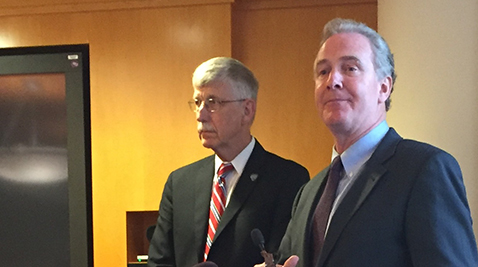CNS-TV Video by Karen Ye.
BETHESDA — Rep. Chris Van Hollen, D-Kensington, warned Tuesday that a government shutdown is likely to repeat the disruption in patient care and research at the National Institutes of Health (NIH) that occurred two years ago.
“We’ve got to avoid another shameful and harmful government shutdown and secondly, we’ve got to make sure that NIH has the resources necessary to do all the work that it does,” the congressman told reporters at NIH’s Bethesda campus.
However, Democrats and Republicans are arguing over how to proceed with funding the government after the end of the fiscal year on Sept. 30.
Senate Majority Leader Mitch McConnell, R-Ky., has said that a federal shutdown is unlikely. In an attempt avoid it, he set a showdown vote for Thursday on passing a short-term spending bill that not only would fund the government into December but also include a GOP provision ending federal support for Planned Parenthood. Senate Democrats want a spending measure without the Planned Parenthood language in it.
Recalling the previous 16-day government shutdown in 2013, Van Hollen said it cost the American economy $24 billion, according to a Standard & Poor’s study. Research at NIH was interrupted and patients were turned away from the clinical center.
Van Hollen’s 8th District includes Bethesda. He is also the top Democrat on the House Budget Committee.
He said that patients with life-threatening conditions like cancer are likely to be denied treatment if the shutdown occurs.
Van Hollen urged more negotiations before the end of the fiscal year to ensure that government functions, including research and treatment at NIH, continue uninterrupted.
NIH Director Francis S. Collins said that contingency plans are being discussed.
“There are animals that have to be cared for. There’s certain types of laboratory equipment that has to be maintained when there’s a great financial loss. But it’s pretty minimal,” he said, referring to what NIH operations could keep running. He added that the NIH will have to maintain a small security force.
The NIH has suffered severe funding cuts and the previous budget had slashed $1.55 billion from the research budget, cutting off funding for more than 600 grants, he said.
Meanwhile, patients and their families are fearing a shutdown, too.
Denyce Frasure, a former court stenographer from Florida who comes to NIH every six weeks so that her husband can get treatment, said: “It affects services. It affects everything here. There is an effect. Even the employees get stressed. Everything is affected and it’s just terrible.”

